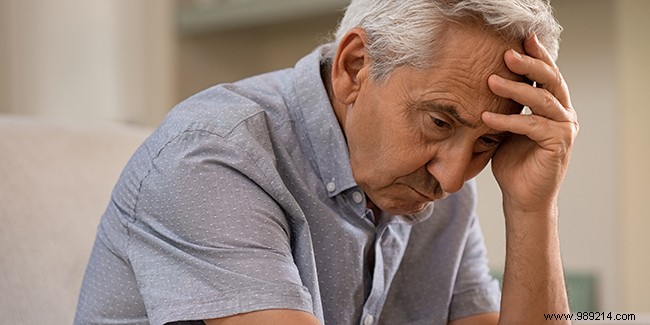
Depression remains too often underestimated among seniors. Dejection, sadness, depression in the elderly are feelings that are often trivialized or poorly detected by the medical profession and relatives. Yet the state of depression, which is a real illness, also exists in this part of the population. How to spot depression in seniors? How to treat it
Depression is not easy to diagnose in the elderly. The elderly are less likely to complain and they express their discomfort less easily than younger populations. The medical profession and loved ones too often consider the lack of spirit of a senior as a normal process of aging.
In addition, the senior very often expresses his depressive state through physical rather than psychological suffering. Depression can be masked by Alzheimer's disease or other dementia problems. It is estimated that between 13% and 40% of seniors are affected by depression, but that the latter remains undiagnosed in more than 70% of cases.
In the elderly, a depressive state is more expressed by very strong anxiety, a loss of interest in things that fascinated them before, pain, the conviction of being affected by many illnesses or even by irritability and aggressiveness. What stands out, and by far, in the depressed elderly person is the feeling of emptiness and uselessness.
Deep sadness, great physical fatigue, physical pain, lack of enthusiasm and self-confidence, withdrawal into oneself or suicidal thoughts should alert seniors when these symptoms take hold over time.
In the elderly, the causes of depression are more often linked to a situation such as the death of a loved one, loss of autonomy, isolation, sleep disorders or serious pathologies. People who suffered from depression when they were younger are also more likely to experience another episode of depression as they get older.
But the aging of the body also explains part of the depressive states. Firstly in question the aging of certain organs but also the imbalance in the production of hormones or neurotransmitters, in particular serotonin which plays a role in the occurrence of depression. Taking certain medications such as corticosteroids, intended to relieve pain, can also promote the onset of depression.
Some specialists link depression in the elderly to vascular accidents such as stroke which reduce blood supply and cause lesions in the brain, and more precisely alterations of the white matter which has the role of transmitting nervous information. from one neuron to another. Depression in some seniors could therefore be due to brain abnormalities. In older people, and more often women, who have had strokes, depression is more common.
Other factors such as retirement, reduced income, loss of social network, entry into accommodation specializing in the care of the elderly can also contribute to the onset of depression. at the senior.
As for the rest of the population, the management of depression in the elderly passes most of the time by taking antidepressant drugs intended to relieve the symptoms of the disease. Sleep disorders accentuated by depression can be limited by taking sleeping pills. However, these treatments must be administered with caution in the elderly whose body absorbs and eliminates medicinal substances less quickly.
As physical pain is often linked to a depressive state in the elderly, it is important to take good care of it to relieve it as best as possible.
If the senior wishes, psychotherapy can also be set up to help him get out of his depressive state. These can be individual or group therapies, based on speech, hypnosis, meditation, sophrology, homeopathy, etc.
Resuming physical activity and building a network of relationships are also very helpful in treating depression in seniors.